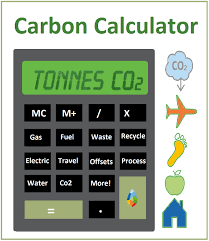This month, we road-test carbon calculators to see which ones deliver the best user experience. A carbon calculator is a great tool to determine your impact and from there take personal climate action. Most calculators collect data from you over a number of categories. All include the 4 main areas of transport, energy, water and waste, and some go further to gather information on travel, food & drink and how many particular purchases you make a year.

We concentrated on Australian calculators and ones that are more geared towards individuals rather than companies and organisations. All had their merits, all were free and all are only as good as the data you input.
Listed in order of preference.
This is a very comprehensive calculator developed by Environmental Protection Authority (EPA). There are 11 modules (or categories) with lots of options. For example, the vehicle module not only asks you the type of car you are driving but also the km you travel annually and the type of fuel. There are 2 modes, Quick and Detailed, and you can easily switch between the 2 as you progress. Lots of opportunities to put in the as much information as you like, e.g. what type of light globes in the home.
When you have completed all the modules (or just the ones you are interested in), you can look at your overall report of your greenhouse emissions. What I like is the report shows a comparison between your greenhouse gas emissions, a typical household’s greenhouse gas emissions and a green household’s greenhouse gas emissions. It’s always good to see how you are fairing compared to others.
You’ll need to create an account with the organisation to use their calculator. This site has a great little 2 min introductory video on how to use the calculator. It is very useful that you can choose to calculate for the past month, 3 months or year. There are 6 categories to work your way through – travel, energy, water, transport, food & drink and waste. You can choose to use personal data or state averages. Lots of tips throughout the calculator to guide you through your calculations. At the end, you will receive an itemised receipt with suggestions to help you reduce your impact over time. This is a really great resource for those not necessarily wanting to purchase carbon credits or offsets with the organisation. Really lovely graphics.
Once again, you will need to create an account so that you can track your footprint over time. As you work your way through various categories such as vehicles, electricity, gas, waste, water, food & drink and air travel, the emissions add up. All calculations are based on a 12 month period. You do need to do a bit of background homework for this calculator, for e.g. how many tonnes of waste you generate per year. It would take time to accurately complete this calculator which is why you need to create an account, you’d need to save your data while you go off to measure and research. I particularly like the ‘event and conference’ category. Simple to calculate with questions such as how many attendees, how much was spent on drinks, food etc.
This calculator uses a sliding scale to determine your position on such things as waste, car usage, housing (size, number of people), food (e.g. how often you eat meat) etc. However, with this calculator it is very easy to over or under estimate. For example, the waste question asks how much waste do you generate compared to your neighbours. I don’t know how full my neighbours bins are, but I guess I could go have a peak on bin night. To be fair, there is the option to ‘add details to improve accuracy’. Your results are given in ‘number of earths’ we would need if everyone lived like you. I do like their personal ‘over shoot’ day, which is the day you effectively use all the Earth’s resources for the year. Really lovely graphics. Engaging.
Whether you’re a customer or not, The Powershop has put together this handy calculator to help you see your household’s carbon emissions generated from electricity usage. You’ll need to know your homes energy usage (kWh), you can find this on your electricity bill. The results are calculated in ‘tonnes of carbon equivalent’. This calculator is only measuring the one category – household electricity usage.
As mentioned earlier, these calculators are only as good as the data you put in and while most are not sophisticated enough to expertly determine your carbon footprint, they do give a good base-line figure. Regardless of what calculator you use, they can be a helpful first step towards a more sustainable lifestyle.
Are you wondering where we stand on the world stage for personal emissions? Alas, the news is not good. Read what SBS News had to say …
‘Despite managing to reduce its per capita emissions, Australia now sits at 11th place compared to all other nations. However, when ranked among countries that are members of the Organisation for Economic Co-operation and Development (OECD) – a group of 38 nations generally regarded as being developed and high-income – Australia ranks first as the bloc’s highest emitter per capita.
According to 2020 figures from Our World in Data – the most recently available per capita data – each person in Australia emits 15.4 tonnes of CO2 annually. This is lower than the 16.3 tonnes in 2019 but still three times higher than the world average of 4.47 tonnes’.
SBS News 2022

We couldn’t finish this blogpost about carbon footprint without a plug for our Subscription for the Planet. On average, we personally generate 15.5 tonnes of carbon annually. Over its lifetime, a tree can collect and store 268kg. This means, we each need to plant 58 trees per year to bring our individual carbon production down to zero (58 X 268 = 15.5 tonnes). A little tricky for most of us in our own backyards. This is where Fifteen Trees comes in. We can annually plant 60 (we’ve rounded up) trees on your behalf. The trees are planted in Australia by community groups. You get to see exactly where your trees are planted. More information here.
If you would like to know more about sponsoring community tree planting projects and how we can assist you and/or your company your sustainable journey, please contact Colleen at <[email protected]>.
Writer: Colleen Filippa
With a background in Environmental Science, Colleen is the Founding Director of Fifteen Trees. In 2009, after 20 years in primary, secondary and tertiary education institutions, Colleen left the classroom to start the company. Fifteen Trees is a social enterprise assisting individuals and companies to reduce their carbon footprint by supporting community groups such as Landcare, schools and environmental networks.


